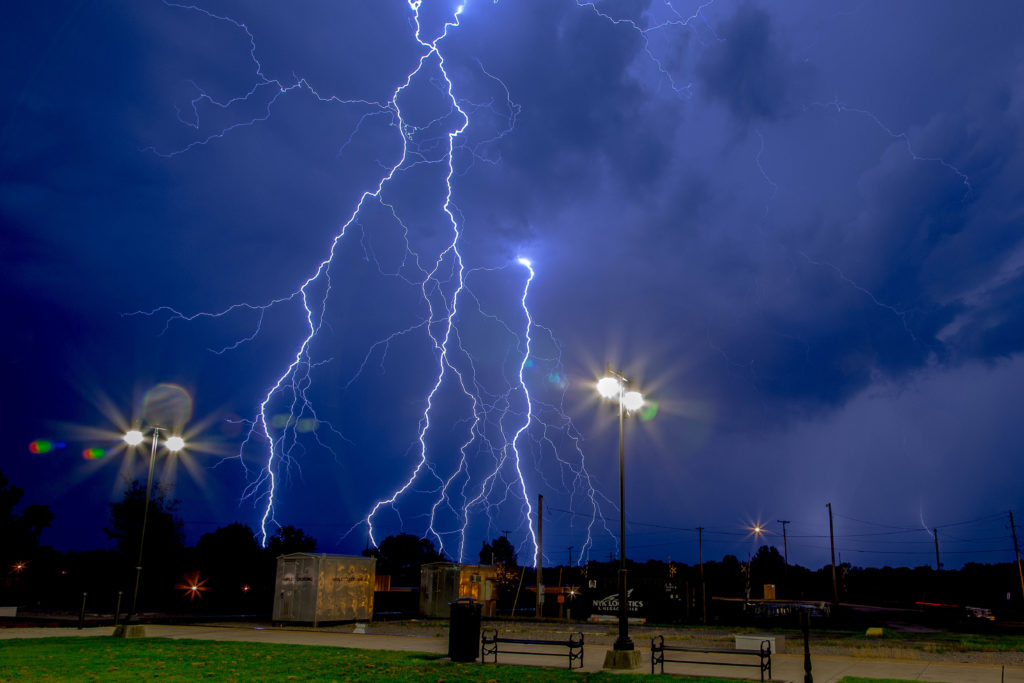Thunderstorms can pose a serious threat to people and property in all parts of the country. In the U.S., over 100,000 thunderstorms occur each year. These storms, which can be accompanied by high winds, hail, and tornadoes, can cause power outages, fires, and flooding.
All thunderstorms produce lightning and should be considered dangerous. Lightning is responsible for over 80 fatalities and 300 injuries per year in the U.S.
Things You Can Do to
Keep Your Family Safe
If your home uses propane, there are a few simple steps you can take to keep your family safe and avoid potential dangers.
- Create an emergency preparedness plan and review it with everyone in your family. Post a list with contact information for your propane retailer and emergency services (fire department, etc.) along with instructions for turning off propane, electricity, and water. If you do need to turn off your propane, contact a service technician to inspect your propane system prior to turning it back on.
- Consider installing uL-listed propane gas detectors and carbon monoxide detectors. These detectors provide you with an additional measure of security. Be sure to follow the manufacturer’s instructions regarding installation, location, and maintenance.
- If you are outside and can hear thunder, you are close enough to the storm to be struck by lightning. Go to safe shelter immediately. Metal objects such as propane tanks and equipment, tractors, and telephone lines can conduct electricity. Do not go near them. If you are caught outside and cannot get to a safe dwelling, find a low-lying, open place away from trees, poles, or metal objects. Make sure the place you choose is not subject to flooding.
- In the event that a flood threatens your safety, you should shut off the gas. Turn off the main gas supply valve on your propane tank, if it is safe to do so. To close the valve, turn it to the right (clockwise). Also, it’s a good idea to turn off the gas supply valves located near individual indoor appliances. You may have to evacuate your property or move to a higher level within your home.
- If a tornado is approaching, immediately take action. If you are inside your home or a building, go to the lowest level possible such as a basement or a storm cellar. If there is no basement, go to the center of an interior room on the lowest level. If you are in a mobile home, trailer, or vehicle, get out immediately and seek shelter in a sturdy building or storm shelter.
- After the storm passes and it is safe to do so, check the entire area for downed power lines, damaged gas lines, or damage to your propane tank. High winds and hail can move, shift, or damage gas lines and tanks. If it is dark, use flashlights, not candles. Immediately call your local utility company or propane retailer if any of these hazards exist. Do not attempt repairs yourself.
- Never use outdoor propane appliances indoors or in enclosed areas, particularly during a power outage. This can result in carbon monoxide poisoning or death. These include such appliances as outdoor portable heaters, barbecue grills, and portable generators. Only use appliances indoors that are designed and approved for indoor use. It’s also important that you never store, place, or use a propane cylinder indoors or in enclosed areas such as a basement, garage, shed, or tent.
- Inspect your propane appliances for water or other damage, if it is safe to do so. If the appliances have electric components and have been exposed to water, they can create a fire hazard. Do not ever turn on a light switch, use any power source, or inspect your household appliances while standing in water. This can result in electrocution.
- Schedule a time for a qualified service technician to perform a complete inspection of your propane system if you suspect any of your propane appliances, equipment, or vehicles have been under water or damaged, or you have turned off your gas supply. Never use or operate appliances, equipment, or vehicles, or turn on the gas supply, until your system has been inspected by a qualified service technician. Do not attempt repairs yourself.
- Exercise sound judgment. As with any challenging situation, your composure during thunderstorms and other severe weather events will ensure you don’t take unnecessary risks or pose any additional dangers to your family and home. Stay calm; use radios, television, and telephones to stay informed and connected. If any questions arise, contact your propane retailer or local fire department.
Taking these 10 simple steps can help promote safety all season long. With a little advance planning, you and your family can be prepared for severe weather events such as thunderstorms.
For additional information on preparing for thunderstorms and other severe weather conditions and natural disasters, visit usepropane.com or contact your propane retailer.

